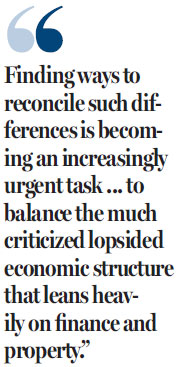It's time for universities to get out of their ivory tower
Updated: 2016-03-30 08:15
By Peter Liang(HK Edition)
|
|||||||||
Stephen Wong Yuen-shan, deputy executive director of think tank Our Hong Kong Foundation, founded by former chief executive Tung Chee-hwa, has urged local universities to work closer with the business sector.
This is not the first time that Hong Kong's institutions of higher education have been criticized for their cloister mentality. Wong said he has often heard complaints from businesses that the city's universities were "detached from the outside world".

The universities have countered by blaming businesses for their overriding concern about quick return, leading them to set mostly unrealistic deadlines for research projects they commissioned. Many businesses, on the other hand, have often complained about the high cost of research which they feel doesn't necessarily justify the results.
Finding ways to reconcile such differences is becoming an increasingly urgent task because of its importance to the development of the SAR's high-value-added technology industry to balance the much criticized lopsided economic structure that leans heavily on finance and property. The government has committed considerable administrative and financial resources to creating an environment to allow the technology industry to thrive.
The universities, however, are widely seen to be lacking behind in such efforts. It's not known if industries in the private sector have benefited in product development or global marketing through the research efforts of local universities.
It has been suggested that to earn subsidies by public funding, there is a need to follow the example set by some other developed economies, particularly the UK, to require universities to show that their research can make an appreciable impact on the economy, society or culture. In Taiwan, for instance, work done for private-sector industries was added as a criterion in reviewing the performances of faculty members of universities.
Hong Kong's universities have been cloistered in the proverbial ivory tower for too long. That was not much of an issue when Hong Kong was a low-cost manufacturing base in the 1960s and 1970s. The shift toward being an international financial center was largely spearheaded by foreign bankers attracted to Hong Kong by its free-market environment.
These heavily subsidized institutions of learning must now take the initiative to break out of their comforting cocoon to answer the public's call.
(HK Edition 03/30/2016 page6)